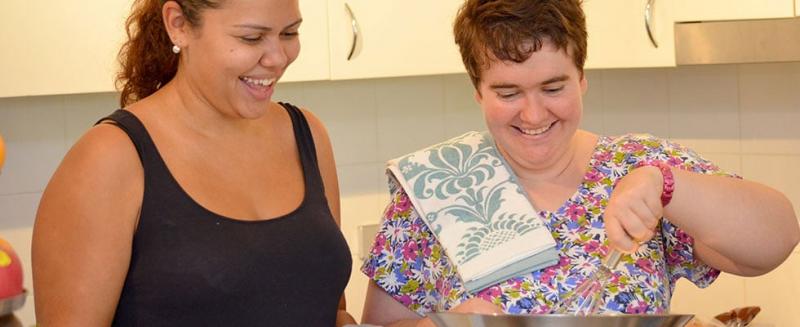
Finding the right housing option
There are so many housing options available, but not all of them will suit you or make you happy.
It is important at this point to be very honest about your needs and restrictions (such as cost).
Your needs = what you cannot live without (E.g. you want to live by the beach)
Your restrictions = what will limit your choices (E.g. stairs or the price of living near the beach)
Don’t give up, just be realistic.
There may be a cheaper ground floor apartment up the road with full access to the beach!
Note – everything funded by the NDIS can also be paid for privately if that is your choice.
Housing options you could choose from
Buy or Rent
Whether you buy or rent, you can still find the same housing options - the person you pay for it changes!
Buying a house may include you working with the bank to get a loan, a Real Estate Agent to find a house, or an SDA provider to have a purpose-built house.
If someone is buying a house for you to live in, they may set up a Trust (such as a Disability Trust) so that the house is looked after for you.
Renting is when you pay a weekly amount to live in someone else’s house. You may rent from a Real Estate agent, an SDA provider, a supported accommodation provider, or a Community Housing organisation or others.
Modified House – Specialist Disability Accommodation (SDA) or Home Modifications
If your disability makes it hard for you to access things like stairs, a shower/bath, high bench tops or hearing the doorbell, you can have houses modified to make your home work for you.
The NDIS can fund home modifications if you have a quote and an assessment done (by an allied health practitioner) to show the necessity.
SDA funding will pay the gap between a standard house and a modified house (renting and buying). SDA funding is only provided to a small proportion of NDIS participants with extreme functional impairment or very high support needs who meet specific eligibility criteria.
SDA has 4 categories ranging from basic modifications, such as wider doors, to robust designs that won’t smash down. You need to apply to NDIA to have your level determined (ask your LAC or Support Coordinator to assist you).
Support workers – Supported Independent Living (SIL) or Core or other
Support needs in the home can vary from needing someone to hoist you in and out of bed, to someone helping you to cook and clean, to someone who helps you to just get out of bed on the really hard days. Core supports are funded in your NDIS plan for a certain number of hours (as per individual needs) and can be used for help at home, assistance going out, or even assistance while you are on holiday. SIL supports are funded in your NDIS plan by a quote the provider creates and can only be used within the house or as per the quote. SIL supports are generally 24/7 so your house usually has a sleepover room close by for the worker. Usually all the people in the house share the SIL supports and use the same provider although you can all have separate providers if you want.
Individual Living Options (ILO)
ILO is a recent funding option available under NDIS but has been around under names like Home Share and Host Family for a long time.
The NDIS website says it includes:
- Living Alone,
- Co-Residency,
- Host Arrangements and
- Living Together options.
Each option will be quoted individually as an arrangement is struck up.
ILO providers will assist with creating the options and writing and maintaining the agreements. An example of an ILO could be a person with a disability owning a home and renting out a room for a reduced rent to someone who in turn offers support as stated in the ILO agreement.
Living alone or with Housemates
Although living alone seems ideal (especially if your reason to move is noisy housemates) it is important to be real about who you are as a person.
Would you like to eat breakfast alone, and come home to an empty house? If that sounds like bliss, then great! But if you had a great housemate would that be better than being alone, and if so, what is a great housemate?
Would you like your housemate to be chatty, or clean, or a great cook, or someone you can work well with to manage a house, or someone who just loves all the same tv shows that you do?
If you take your time choosing the right housemate, then it will make your house a home.
This is a developing space in the market currently so I would suggest there will be some great housemate matching sites or apps very soon.
Things to consider
Budget
This includes how much money you earn and how much funding you can get. This is vital information to know before you move out.
As a rough guide your rent should be no more than a third of your income.
On top of that, you will need to budget for food, utilities (electricity, gas, water), phone, internet, travel, fun, savings and more.
Here is a tool to help you work out your budget.
Can you earn more money? Can you reduce costs?
If you have a very low income and you cannot earn more money you may need to share, care or live in a cheaper location.
Do not give up on your goal however, you just need to be smart about your options.
Location
Depending on your individual life you can live anywhere you choose.
However, you may want to be near work or family, public transport, shops, the library, or the hospital.
Your budget will influence where you live: you could choose to live in a great house near public transport that will easily get you to work and family, or a smaller flat that is within walking distance from work and family.
You need to choose the location that will give you the best access to a community of people that suit you.
Do you like gardening, or getting a coffee, or just sitting somewhere and watching nature. These things can be found for you and will be the things that extend beyond your home to make your whole community your home.
WEBINAR: Disability Accommodation & the NDIS
During this FREE 1 hour webinar our experts answer questions like:
1. What Accommodation options does the NDIS fund?
2. How can I include Accommodation in my NDIS Plan?
3. How do I find the best Accommodation for me?
Watch: Recorded Webinar
This Blog is part of our Disability Accommodation series:
- 4 Steps to Disability Housing Success
- Step 1: Setting Disability Housing Goals
- Step 2: What Disability Housing Options Are There?
- Step 3: Find the House and Get It!
- Step 4: Moving Out
Prepared for MyCareSpace by Your Community Home - Housing Support Coordination
NDIS THERAPY FINDER - FREE SERVICE
LET US FIND YOU A SKILLED SUPPORT WORKER



